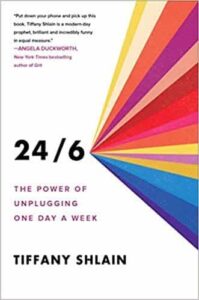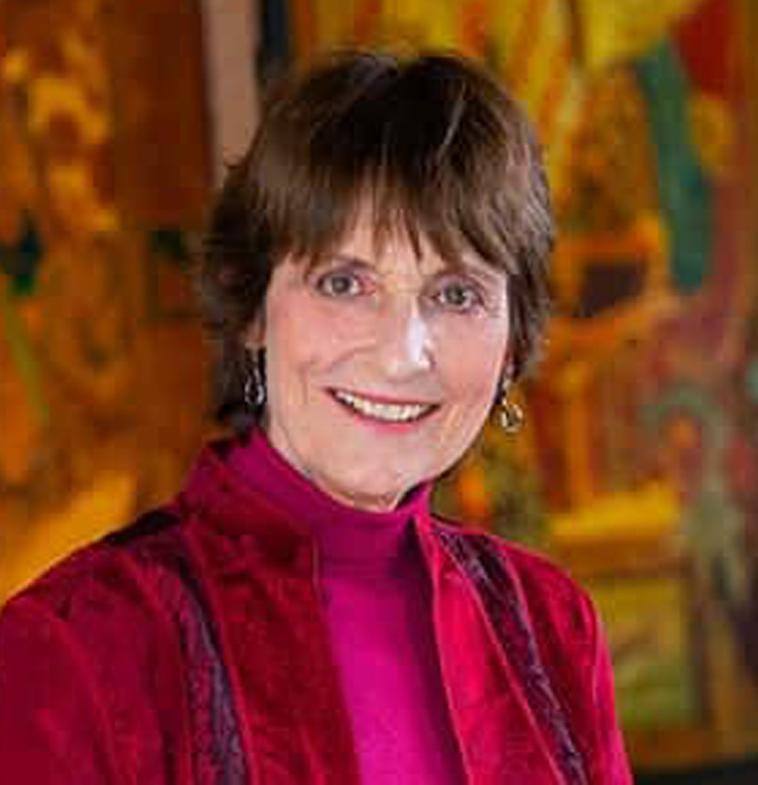
Tiffany Shlain speaks with the unique voice of a woman in tech. In her 20’s she celebrated the possibilities of being connected on the internet when she founded the Webby Awards, but after 2007 when the smartphone was invented, things began to change. Everyone began looking at their screens and not at each other. In fact, she felt so disconnected that she and her husband (also a tech professional) began turning off their screens one day a week. She calls it their “technology Shabbats” and it has improved their lives so much that she wrote a book about it, 24/6: The Power of Unplugging One Day a Week.
An Emmy-nominated filmmaker, Tiffany asks a key question in many of her films, “When does technology amplify who we are as humans and when does it diminish us?” After the iPhone came out and she could take a supercomputer with her into the bathroom, the bedroom, and everywhere else, she no longer felt present anywhere. While her father was dying with a brain tumor and she was pregnant with her daughter, she thought a lot about life and death and why we are here. She craved time off to refresh and connect and started practicing the 3,000-year-old tradition of Sabbath—a day with screens turned off to rest, think and hear your own voice.
24/6: Memoir Meets Neuroscience Meets Visions of the Future
 Tiffany’s new book, 24/6: The Power of Unplugging One Day a Week, tells about her family’s decade of practicing their technology Shabbat, discovering what gives her joy, and how dinnertime is enriched by personally connecting with family without screens to distract them. She examines what all that screen time is doing to us, and how periods of rest affect our productivity and creativity. She says that we need to disconnect to restore our unique perspective, so we can bring our independent creative thinking back to the conversation. Called a visionary and prophet by some, Tiffany predicts that we will burn out if we don’t stop the way we’re allowing tech to drive our lives every minute of every day. She says there are a host of behavioral scientists and engineers designing ways to keep us addicted to the web, and they’re winning.
Tiffany’s new book, 24/6: The Power of Unplugging One Day a Week, tells about her family’s decade of practicing their technology Shabbat, discovering what gives her joy, and how dinnertime is enriched by personally connecting with family without screens to distract them. She examines what all that screen time is doing to us, and how periods of rest affect our productivity and creativity. She says that we need to disconnect to restore our unique perspective, so we can bring our independent creative thinking back to the conversation. Called a visionary and prophet by some, Tiffany predicts that we will burn out if we don’t stop the way we’re allowing tech to drive our lives every minute of every day. She says there are a host of behavioral scientists and engineers designing ways to keep us addicted to the web, and they’re winning.
She also notes that teen suicide has risen 57% since 2007, (the year smartphones came out). She says, “Kids are handed supercomputers before they are emotionally able to deal with everything coming at them.” She says that as a society we need to ask, “Is this a good way to live?” And she also advises that we need to have weekends off again and suggests several ways companies and governments should get involved.
How Living 24/6 Affects Daily Living
Tiffany says that turning off screens one day a week makes you more intentional about the other six days. She tells how her Facebook group supports each other with ideas of things to use for daily living instead of screens. Tiffany uses a notepad again and a paper planner, because it’s more thoughtful to bring out a notepad instead of a cell phone at a dinner meeting. Nancy talks about the time she is gaining by adopting 24/6 and how she plans to start painting again—something she hasn’t had time for in years.
Listen to this interview for many more perspectives on how cell phones are affecting children, the benefits of taking charge of the way we use technology and more about the root concept of taking a sabbatical to get recharged. Then check out Tiffany’s website for upcoming speaking events, buy the book here, and get acquainted with her filmmaking at LetItRipple.org. Tiffany announced in this interview that she will be premiering a new art form which she calls “spoken cinema” at the Museum of Modern Art in February.

